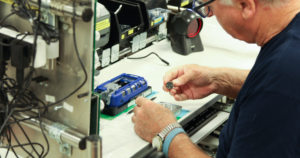 For many heating engineers, the flue gas analyser is vital kit; so much so, that most would have problems working without one. However, calibration and servicing generally require the engineer to send the analyser away for a while. That’s why, when the annual calibration date comes around again, some find themselves tempted to put it off, just for a while …
For many heating engineers, the flue gas analyser is vital kit; so much so, that most would have problems working without one. However, calibration and servicing generally require the engineer to send the analyser away for a while. That’s why, when the annual calibration date comes around again, some find themselves tempted to put it off, just for a while …
Please ignore that temptation. It is absolutely vital to get your flue gas analyser calibrated every year, and failing to do so could cost you your job – or worse. Prompt annual calibration is simply not negotiable, and in this blog post we’ll explore the reasons why.
Annual certification required
A flue gas analyser is safety equipment and its accuracy may be – quite literally – a matter of life or death. The sensors inside flue gas analysers react with the gasses they detect and degrade slightly over time. Compiled over the course of a years active use, the degradation can lead to inaccuracies in the readings. Additionally, like any equipment, things can go wrong and parts can fail; that’s why all flue gas analyser manufacturers require an annual certificate of calibration, and the impact of not having one can be legally, financially and personally disastrous.
Imagine, for example, that an accident has occurred and somebody or something has been harmed because your flue gas analyser failed to detect an issue. If that analyser was uncertified and had not been calibrated within the time period required (which would be easy to ascertain, since gas reports have the relevant times and dates printed on them), then you and/or your employer may be held criminally and civilly liable for this, having failed to exercise your duty of care to your client.
That’s why, if your flue gas analyser is showing any signs of failure, or if your annual calibration is due, you need to book it in promptly.
What about costs?
Sometimes, engineers are tempted to put off calibration for fear of the costs. And yes, there may be charges involved due to damage or wear and tear: but what price do you put on safety (both the safety of the people you serve the security of your own job or business?) If cost is an issue, there may be ways to mitigate this. Manufacturers know that calibration is a recurring cost and some offer pre-pay options to make this easier to manage; some offer pre-pay options for parts as well. If you’re not sure whether this is the case for your device, it is worth talking to the manufacturer because the savings can be substantial.
What happens during calibration?
During its annual service and calibration, your flue gas analyser will be checked over and any components (for example, an oxygen sensor) will be replaced as required. A known concentration of certified test gas will be passed into the analyser and the instruments software will be adjusted to make sure it takes into account any drop off in sensor response and to ensure the analyser responds appropriately to all gases across the range of detection.
Don’t wait – calibrate
As you can see, calibration and any associated changes are vital to the functioning of your analyser, so you should never postpone or overlook your annual calibration: in fact, you must not use a flue gas analyser at all, once the previous calibration has expired. This applies however often (or not) you use it: the risks are the same.
Book your calibration here.
